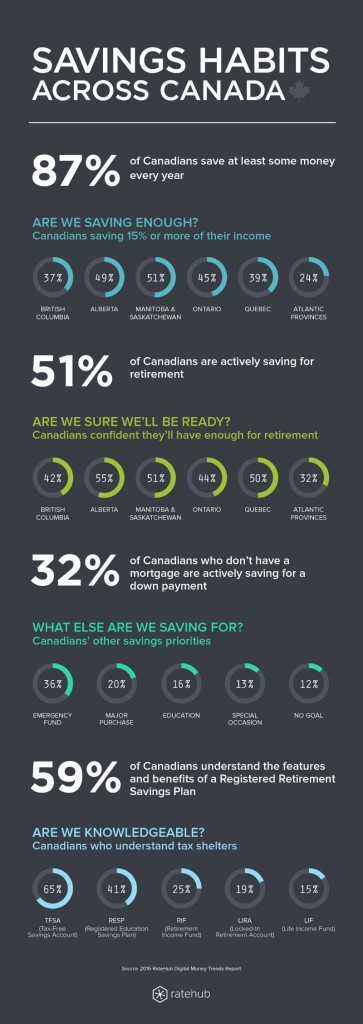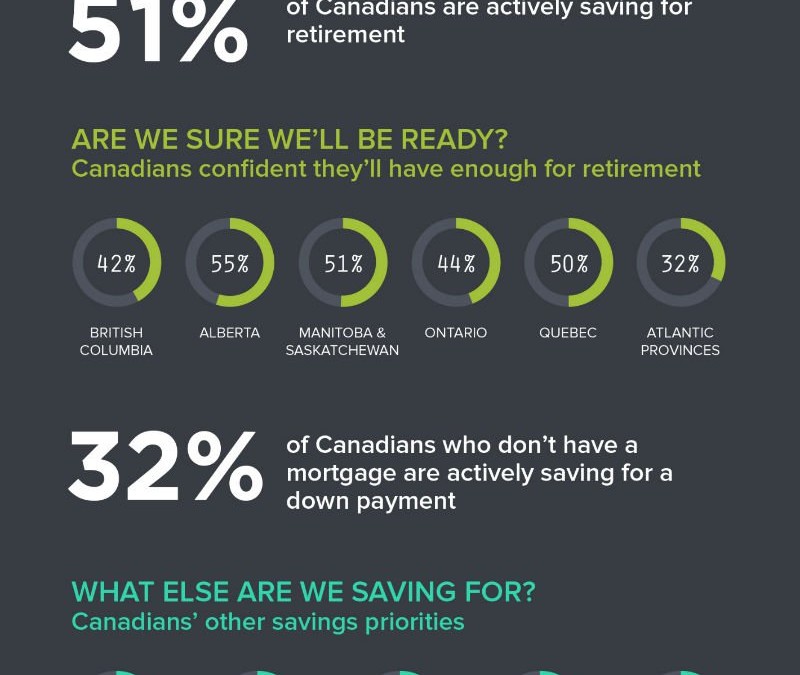Lez talk about saving. Not our favourite thing to talk about at New School since we believe earning and investing your money can be far less painless than cutting back! But saving is also an essential part of the money equation and thus we must pay attention to it.
Rate Hub recently released a fascinating report on the saving habits of Canadians.
The good news is that 87% of Canadians are saving SOMETHING each year. But at the same time, 42% of Canadians have credit card debt.

This may indicate some cognitive dissonace in the people of our great nation, since savings interest rates are less than 1.7% while credit card interest rates top 20%.
But we also have to keep in mind that it helps people stave off a sense of hopelessness to put something away even when they owe, and it also creates good habits, so it’s not necessarily a bad thing.
The question that stuck out the most in this infographic to us is “What else are we saving for?” It’s clear that Canadians primarly save for retirement and a down-payment, but what about everything else in life? What is our money actually FOR? Security is obviously the overwhelming goal of Canadians, but what about life beyond that? What about adventure, acheivement, beauty, joy, fun and leisure?
Thankfully, it seems Canadians do have a wild side. According to Rate Hub, travel was the most mentioned savings goal outside the typical responsible stuff like emergency fund and education.
But how are Canadians going to save enough to achieve retirement, a property, an emergency fund, an education AND travel?
It seems almost too overwhelming when you think about it too hard.
The biggest advice we can offer is to be aware and have a plan. Don’t stumble through your money blindly, hoping that it will all work out. Know what you make, know what you earn, know what you owe and know how much what you want is going to cost. Only then can you figure out what dreams are achievable, and what to adjust so that they are.
For this we highly recommend our online course GET ON TRACK.
We’ll create realistic “spending guidelines”. When you over budget yourself, it’s like being on an all lettuce diet. It’s not sustainable and eventually you binge. This course will not set you up to fail.
The only way to reach your goals within the time frame you want is to reduce spending or make more money. We can’t control what we earn in the short-run, so reducing spending where we can get on track ASAP.
We’ll show you how to take a hard look at
•What’s coming in
•What’s going out
•How much you can REALISTICALLY SAVE for
•Debt repayment
•Short-term
•Medium Term and Retirement goals
You can use this tool every year to plan the new year ahead and ensure that you’re on track!


Recent Comments